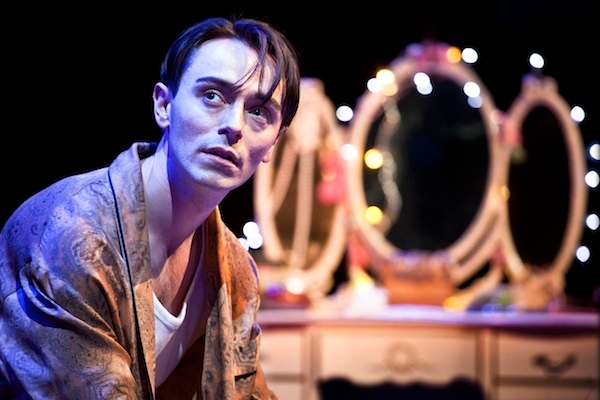Ever been to a ‘promenade performance’? Barmy, really. The audience is conducted through a makeshift theatre space — often a disused ironworks — where the show is performed in disjointed snatches amid atmospheric clutter. Invariably hopeless as drama, promenade shows can be revealing as social anthropology. They lay bare a secret that lies at the heart of theatrical life: actors loathe play-goers. Without a paying audience, all theatre is simply am-dram. And actors have a morbid fear of slipping into the underclass of voluntary performance. So they covertly resent ticket-buying audiences who alone have the power to convert an unpaid show-off into a self-regarding thesp, with his agent and his Spotlight listing and his drink problem. This latent hostility remains inactive most of the time but at a promenade show it emerges in plain view because the audience is at the performers’ mercy and the temptation to goad, humiliate and scare them becomes irresistible.
In the Beginning Was the End made no attempt to conceal its bullying instincts. It was skilfully done, too, and it rapidly set about destroying our peace of mind. No story or text was presented. Separated into small groups, we were led by unsmiling usherettes through a warren of converted rooms in Somerset House. Early on, we took our seats in a quiet boardroom, whose walls suddenly collapsed to reveal actors dressed as mad scientists screaming instructions at us in Slavic languages. In adjoining rooms, more actors barked out lectures in French and German. In a darkened hallway, laughing performers stripped naked and capered up and down, giggling. Later, I found myself walking through an under-lit corridor with doorways on either side leading to unknown torments. All around, ghostly wardens stared straight through me with deadened eyes. Very unsettling.
My brain groped for certainty amid a host of unfamiliar sensations: the eerie lighting, the chalky stink of fresh plasterwork, the whispers and shuffles of hidden performers, and the yielding creaks beneath my footfalls. I was nagged at by a constant fear that some new prank was about to be played on me. Anyone who has been arrested and interrogated by secret policemen must have endured something like this nervy, skin-crawling ordeal. I never thought I’d write these words but here goes. I hated this show. I couldn’t wait to escape. It was sheer torture. And for that reason, I declare it a triumph. It revealed an abiding truth about the twisted relationship between theatrical artists and their hapless patrons.
The Rose, in Kingston, is an architectural muddle. The beautifully proportioned seating area is marred by a cumbersome, overlarge acting space. This great barn is particularly hostile to drawing-room plays that need solid walls and credible furnishings to convey their atmosphere. Staging The Vortex here is quite a challenge. And then there’s the play. Noël Coward’s breakthrough hit from 1924 is a provocative, morbid, self-pitying melodrama, quite unlike anything he later produced. The comedy is acidic. The atmosphere is fretful and sour. The characters buzz around like clever, brittle hornets plunging their stings into each other’s hides. All the charm in the world is never enough to sweeten the atmosphere and to remove its air of mawkish cruelty. Remember, this was not written by the great Sir Noël Coward, the nation’s favourite wag, but by an angry young Bohemian spiv, a chancer with no reputation at all, who wanted to smash the bourgeoisie in the face with his elegant, velvet-clad fist.
The plot is a tangled romance between Florence, an ageing cougar, and her young toyboy, Tom. Their affair implodes when Florence’s son Nicky returns from Paris with his new fiancée Bunty, who happens to be Tom’s former girlfriend. Nicky is addicted to ‘drugs’ (code for homosexuality) and the play culminates in a scene of rapturous exhibitionism as Nicky and Florence confess their vices to one another and agree to end their compulsive behaviour. This finale never feels entirely convincing.
There are strong performances in Stephen Unwin’s production but they make the show lopsided. The star turn is James Dreyfus, playing a catty old woofter, but the role is too small for an actor of his calibre and his absences from the stage deprive the show of energy and fun. Kerry Fox is all right as Florence, the whingey nympho sleeping her way through Sandhurst, but she suggests too little of her character’s sensuality and erotic adventurism. David Dawson, who may become a star, captures Nicky’s sexual ambivalence brilliantly but he over-stresses the character’s aggrieved bitterness at the cost of lightness and frivolity. William Chubb is excellent as the dreary upstanding husband whom Florence rejects in favour of cadets half her age.
If I lived in Kingston, I’d regard this as a pretty good night out. Were I further afield, I wouldn’t be so sure.







Comments